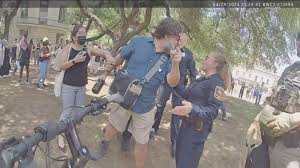A University of Texas at Austin (UT) lecturer, Richard Heyman, was fired this week following his arrest at a pro-Palestinian demonstration on campus in April.
The incident has sparked debate about academic freedom and the rights of faculty members to participate in protests.
Heyman, who taught courses in American Studies for 18 years, was arrested by the Texas Department of Public Safety (DPS) and charged with interfering with public duties, a misdemeanor.
According to DPS, the charge stems from Heyman’s actions during a protest where authorities cleared an encampment set up by pro-Palestinian demonstrators.
Heyman’s lawyer, Gerry Morris, contends that the university fired Heyman without proper investigation. Body camera footage released by DPS shows Heyman arguing with troopers and attempting to bypass a bicycle barrier after a dispersal order was issued. The footage also reportedly shows Heyman grabbing a trooper’s bicycle.
The university has not provided a specific reason for Heyman’s dismissal. However, the case has drawn criticism from free speech advocates who argue that UT should have afforded Heyman due process before terminating his employment.
The incident comes amid heightened tensions surrounding academic freedom on college campuses nationwide. Critics argue that universities are increasingly restricting faculty speech and activism, particularly on controversial topics.
Heyman’s case is likely to be closely watched by faculty rights groups and free speech organizations. It remains to be seen whether Heyman will challenge his termination or if the university will offer further clarification on its decision.
Fallout from UT Lecturer Firing Continues
The firing of UT lecturer Richard Heyman continues to reverberate across the university and beyond. Here’s a look at the latest developments:
- Faculty Support: The American Association of University Professors (AAUP) has issued a statement expressing concern about Heyman’s dismissal. The AAUP argues that universities have a responsibility to protect the free speech rights of faculty members, even when their views are unpopular.
- Student Response: Student groups on campus are divided. Some students support the university’s decision, citing the need to maintain order during protests. Others are organizing rallies in solidarity with Heyman, arguing that his actions were protected by free speech.
- Legal Action: Heyman’s lawyer, Gerry Morris, has hinted at the possibility of legal action against the university. The lawsuit could center on claims of wrongful termination or violation of academic freedom.
- University Response: The University of Texas has remained largely silent on the specifics of Heyman’s case. However, university officials have emphasized their commitment to upholding the law and maintaining a safe and orderly campus environment.
The Heyman case raises important questions about the balance between free speech, public safety, and the role of faculty members in social activism.
It’s a complex issue with no easy answers, and the debate is sure to continue in the coming weeks and months.
Here are some additional points to consider:
- Was the university’s response proportionate to Heyman’s alleged actions?
- Did the university adequately investigate the incident before firing Heyman?
- Could this case have a chilling effect on faculty activism at UT and other universities?
As the story unfolds, it will be interesting to see how these questions are addressed and how the Heyman case impacts the national conversation about academic freedom.









